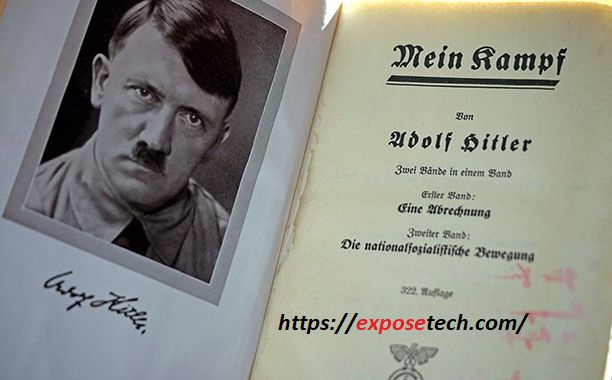Adolf Hitler’s “Mein kampf in english” stands as one of the maximum debatable and deeply unsettling texts in current records. Its effect on the twentieth century cannot be overstated, and its presence maintains to provoke robust reactions in the 21st century. Translated into English, this infamous paintings offers insights into Hitler’s ideology, rhetoric, and the historic context that formed his worldview.
The Genesis of “Mein kampf in english”:
Published in 1925, “Mein kampf in english,” which interprets to “My Struggle” in, emerged throughout Hitler’s imprisonment following the failed Beer Hall Putsch of 1923. Originally intended as a memoir and political manifesto, the book outlines Hitler’s non-public journey, his political ideology, and his vision for Germany’s future. It served as a platform for his anti-Semitic, nationalist, and authoritarian beliefs, which might later gasoline the atrocities of the Holocaust and World War II.
Themes and Ideologies:
At the core of “Mein kampf in english” lies Hitler’s fervent notion in racial purity and the prevalence of the Aryan race. He depicts Jews because the embodiment of evil, blaming them for Germany’s perceived woes and advocating for their exclusion and eventual eradication. His disdain for democracy, Marxism, and liberalism permeates the text, as he champions the status quo of a totalitarian regime beneath his management. Moreover, Hitler’s expansionist targets and preference to overturn the Treaty of Versailles underscore his militaristic schedule.
Rhetorical Strategies:
Hitler’s rhetoric in “Mein kampf in english” is manipulative and persuasive, aimed toward indoctrinating his readers and garnering guide for his reason. He employs emotive language, portraying himself as a savior parent tasked with rescuing Germany from purported enemies. By exploiting worry, insecurity, and nationalistic fervor, he galvanizes his audience, fostering a feel of team spirit and cause among his fans. Furthermore, his use of repetition, propaganda strategies, and scapegoating approaches reinforces his ideological message and solidifies his authority.
Controversies Surrounding the Translation:
The translation of “Mein kampf in english” has sparked tremendous controversy and moral debates. While some argue that making the text available lets in for essential analysis and historical information, others fear that its dissemination may inadvertently perpetuate hate speech and incite violence. Moreover, concerns have been raised concerning the capacity glorification of Hitler and his ideologies via translation, in addition to the danger of misinterpretation or manipulation by way of extremist organizations.
Educational Value vs. Moral Considerations:
Balancing the instructional cost of translating “Mein kampf in english” with ethical and moral issues poses a dilemma for pupils, educators, and publishers alike. While reading the textual content can offer precious insights into the upward push of fascism, the Holocaust, and the psychology of dictators, its dissemination have to be followed through essential evaluation, contextualization, and discussions about its implications. Emphasizing the historic context, exposing the fallacies of Hitler’s arguments, and promoting tolerance and empathy are important components of responsible engagement with the text.
Lessons from History:
The booklet of “Mein kampf in english” serves as a poignant reminder of the risks of unchecked authoritarianism, propaganda, and hate speech. It underscores the importance of safeguarding democratic principles, shielding human rights, and confronting bigotry and prejudice anyplace they stand up. By studying the origins and effects of ideologies espoused in texts like “Mein kampf in english,” societies can attempt to save you the recurrence of atrocities and uphold the values of justice, equality, and compassion.
Conclusion:
“Mein kampf in english” remains a haunting testament to the darkest depths of human depravity and ideological extremism. Its translation into English opens a window into the thoughts of one in every of history’s maximum notorious figures, providing both a caution and a mission to future generations. By confronting the legacy of “Mein kampf in english” with braveness, introspection, and clear up, we honor the victims of fascism and reaffirm our commitment to constructing a international rooted in peace, understanding, and mutual admire.

